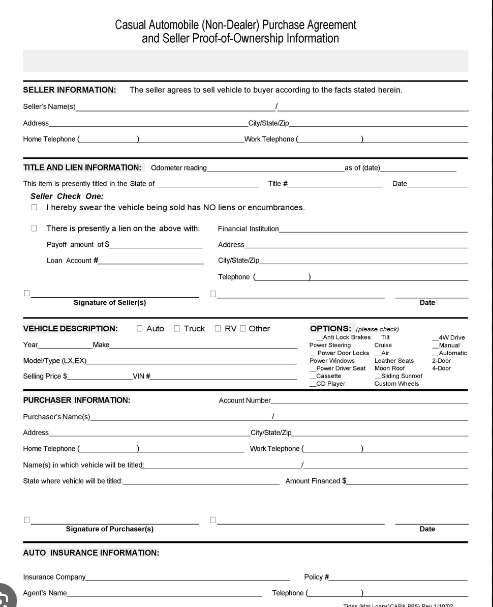5 Essential Documents for Buying a Car

When it comes to buying a car, the process can seem overwhelming, especially when you get down to the nitty-gritty details like paperwork. Whether you're a first-time buyer or you've been through this process before, having the correct documents at hand is critical. This post delves into the 5 essential documents you need when purchasing a vehicle, making sure you're prepared for everything from the test drive to the final signatures.
The Bill of Sale

The bill of sale is your proof of purchase. It lists details like:
- The vehicle identification number (VIN)
- The make, model, and year of the car
- The price agreed upon
- The names, signatures, and contact information of both the seller and the buyer
This document is crucial as it’s an official transfer of ownership agreement between buyer and seller.
What to Look Out For:

- Ensure all information is correct and legible.
- Make sure the bill of sale includes the date of the transaction.
- If possible, have a copy of this document notarized to add an extra layer of legal protection.
📝 Note: Keep this document safe as it could be required for insurance claims, warranties, or in case of disputes over ownership.
Title or Ownership Documents

The title is legal proof of ownership. Here’s what you need to know:
- The title must be signed over to you by the seller.
- It should include the current owner’s information and the lienholder information if there’s an outstanding loan on the car.
- Ensure the title matches the car’s VIN and other identifiers.
Important Considerations:

- If the car is still under a loan, the title will not be available until the loan is paid off. The seller must arrange for the lien release.
- If buying from a dealership, they often handle the title transfer, but be aware of the process.
🚗 Note: The process for transferring titles can differ significantly between states. Always check local requirements.
Application for Registration and Title

Once you have the car in your possession, you’ll need to apply for a new title and registration in your name. Here are the steps:
- Fill out the title application form.
- Submit the form along with the title, bill of sale, proof of insurance, your ID, and payment for fees.
Things to Remember:

- Registration fees can be high, especially if you’re out-of-state.
- Some states might require a smog check or safety inspection before registration.
Vehicle History Report

Obtaining a vehicle history report can reveal:
- Any previous accidents or damage to the vehicle.
- Odometer readings for any discrepancy check.
- Past and current ownership details.
- Service records, if reported.
Benefits of a Vehicle History Report:

- It helps you make an informed decision about the car’s past.
- Can lower the price negotiation if issues are found.
🔍 Note: Many sellers are upfront about providing a vehicle history report, but be cautious if they're not; it might be worth running one yourself.
Insurance Proof

Before you can legally drive your new car off the lot, you need insurance. Here are some tips:
- Get insurance quotes before making a purchase to ensure you’re covered from day one.
- Check if the seller has insurance on the car and for how long it’s valid.
- Understand the minimum coverage requirements in your state.
Why Insurance is Key:

- It protects you, your new car, and potentially other drivers in case of accidents.
- Lenders will require proof of insurance before issuing the loan or title.
Final Thoughts

Bringing your car home is an exciting experience, and having these five documents ensures that you can do so legally, safely, and confidently. They form the backbone of a secure car buying experience, covering you in terms of legal ownership, transparency, and protection. Remember, preparation is key. Take your time to understand each document, ensure all details are correct, and store them safely. This way, you can hit the road with peace of mind, knowing you’ve completed the process the right way.
Can I buy a car without a vehicle history report?

+
Technically, yes, but it’s not advisable. A vehicle history report can uncover issues that might not be disclosed by the seller, potentially saving you from future financial and safety concerns.
What if the car has a lien on the title?

+
If there’s a lien, the title won’t be released until the loan is paid off. Ensure the seller can provide a lien release or have them pay off the loan with your purchase funds before you take the car.
How long do I have to register my new car?

+
The time to register your car varies by state, but usually you have 30 days from the date of purchase to complete the process. Check with your local DMV for specific deadlines.
Do I need to buy insurance before signing the purchase agreement?

+
While it’s not strictly necessary, having insurance beforehand is highly recommended. You’ll need to provide proof of insurance to register the vehicle or drive it home, so it’s better to be prepared.
What should I do if I find errors in the documents?

+
If you find any errors in the documents, address them immediately with the seller. Corrections can be made, but often they must be done before the transaction is completed or shortly after to avoid complications.



